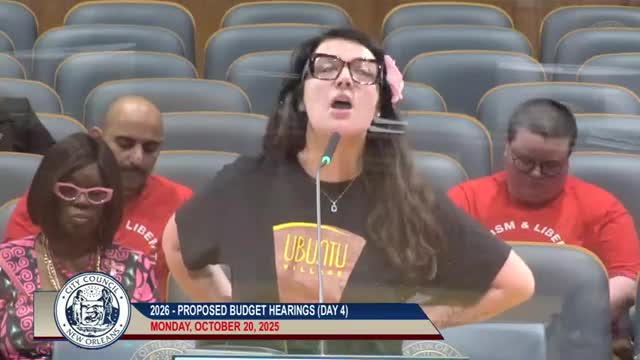Council hears evidence of cost savings from INSTEAD diversion program as staff seek sustained funding
October 20, 2025 | New Orleans City, Orleans Parish, Louisiana
This article was created by AI summarizing key points discussed. AI makes mistakes, so for full details and context, please refer to the video of the full meeting. Please report any errors so we can fix them. Report an error »

The Office of Criminal Justice Coordination told the Budget Audit Committee Monday that community-based diversion programs, including INSTEAD and the Evening Reporting Center, show measurable cost savings and reduced returns to the justice system, and that proposed budget reductions could affect those services.
Criminal Justice Commissioner (reporter) outlined recent outcomes and grants administration: since 2023 his office has administered more than $8.7 million in state and federal grants and has stood up data-sharing agreements among eight criminal justice agencies. He said several grants were currently withheld due to federal executive orders but that the office has maintained grant processes so funds can move quickly if statuses change.
Speaking specifically about INSTEAD — a city-funded community case-management diversion program — the commissioner said an evaluation estimated every dollar invested returned between $1.20 and $3.61 in savings. He said INSTEAD sought funding to increase capacity by 120 additional referrals and that program staff and partner agencies reported high completion and post-program retention. A representative said INSTEAD had received roughly 212 referrals year-to-date and accepted more than 100 cases with an approximately 85–82 percent completion rate, and that many participants remain connected to case managers after program completion.
Proponents including program alumni and representatives from the District Attorney and Public Defender offices testified to the program's performance. Daniel Shanks (District Attorney's Office) and Barksdale Hortense (Orleans Public Defender) said INSTEAD reduces incarceration costs, supports participants in obtaining benefits and housing, and has strong completion and post-program engagement metrics.
The Criminal Justice Office also reported that the city jail population stood at about 1,435 and that the average length of stay at Orleans Justice Center is about 57 days, producing a per-person incarceration cost that council members and staff said increases pressures on city budgets. The commissioner noted recommendations to reduce jail population include ensuring convicted inmates who belong to the state Department of Corrections are promptly moved out of city custody.
No formal committee vote on INSTEAD funding took place; council members requested additional data about the Evening Reporting Center and INSTEAD evaluations and asked staff to circulate evaluation materials for further review during budget negotiations.
Criminal Justice Commissioner (reporter) outlined recent outcomes and grants administration: since 2023 his office has administered more than $8.7 million in state and federal grants and has stood up data-sharing agreements among eight criminal justice agencies. He said several grants were currently withheld due to federal executive orders but that the office has maintained grant processes so funds can move quickly if statuses change.
Speaking specifically about INSTEAD — a city-funded community case-management diversion program — the commissioner said an evaluation estimated every dollar invested returned between $1.20 and $3.61 in savings. He said INSTEAD sought funding to increase capacity by 120 additional referrals and that program staff and partner agencies reported high completion and post-program retention. A representative said INSTEAD had received roughly 212 referrals year-to-date and accepted more than 100 cases with an approximately 85–82 percent completion rate, and that many participants remain connected to case managers after program completion.
Proponents including program alumni and representatives from the District Attorney and Public Defender offices testified to the program's performance. Daniel Shanks (District Attorney's Office) and Barksdale Hortense (Orleans Public Defender) said INSTEAD reduces incarceration costs, supports participants in obtaining benefits and housing, and has strong completion and post-program engagement metrics.
The Criminal Justice Office also reported that the city jail population stood at about 1,435 and that the average length of stay at Orleans Justice Center is about 57 days, producing a per-person incarceration cost that council members and staff said increases pressures on city budgets. The commissioner noted recommendations to reduce jail population include ensuring convicted inmates who belong to the state Department of Corrections are promptly moved out of city custody.
No formal committee vote on INSTEAD funding took place; council members requested additional data about the Evening Reporting Center and INSTEAD evaluations and asked staff to circulate evaluation materials for further review during budget negotiations.
View full meeting
This article is based on a recent meeting—watch the full video and explore the complete transcript for deeper insights into the discussion.
View full meeting
